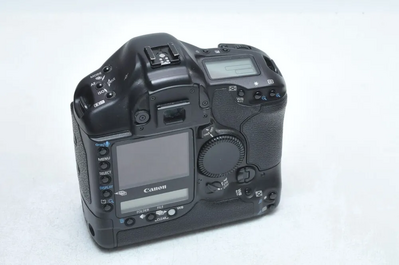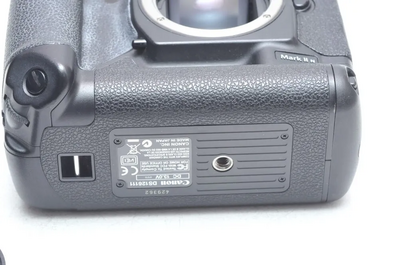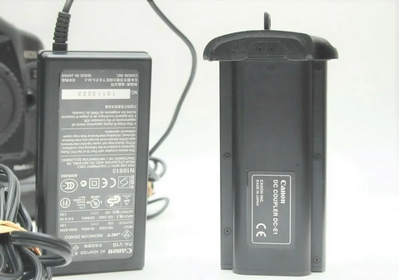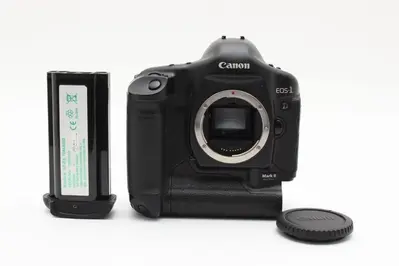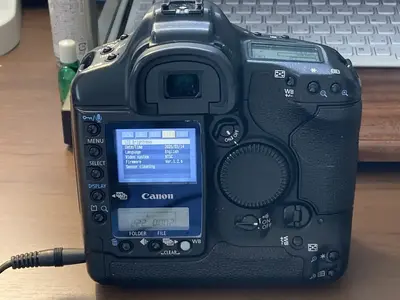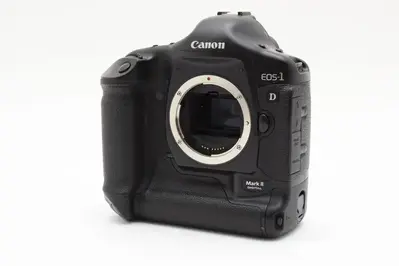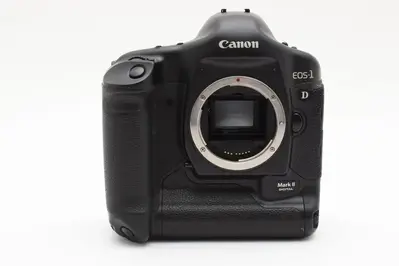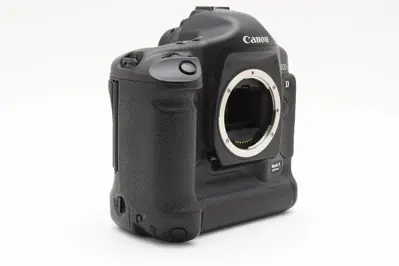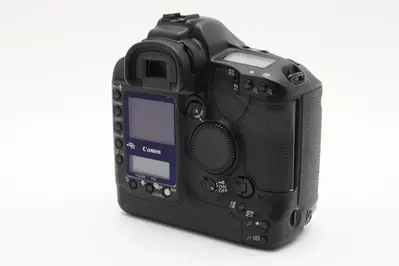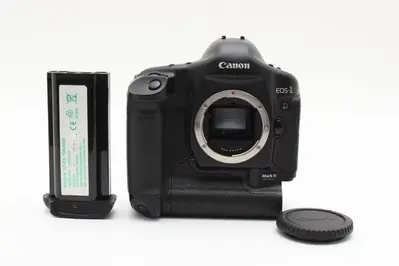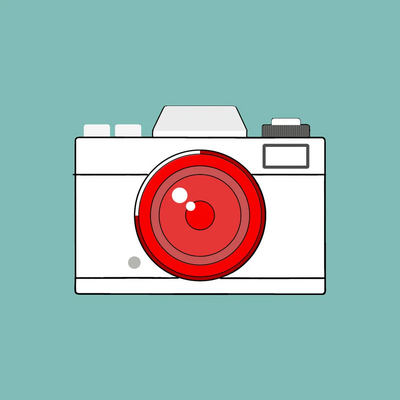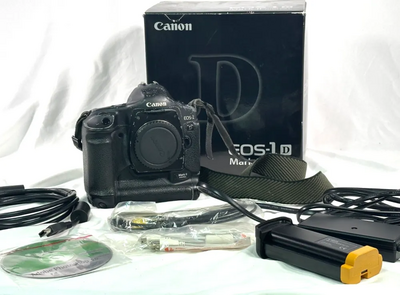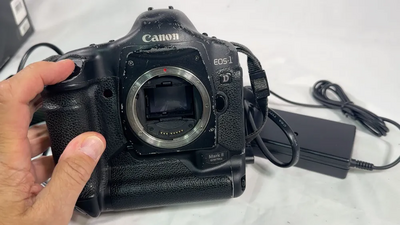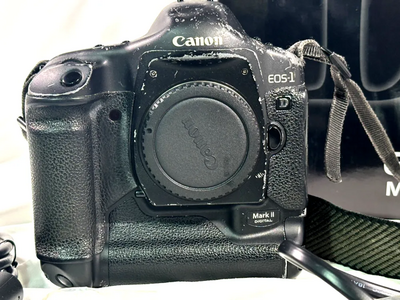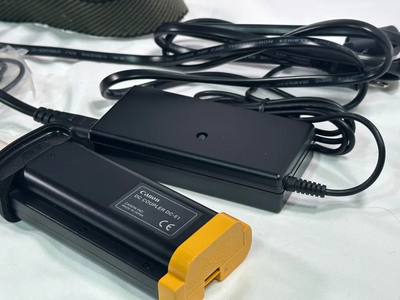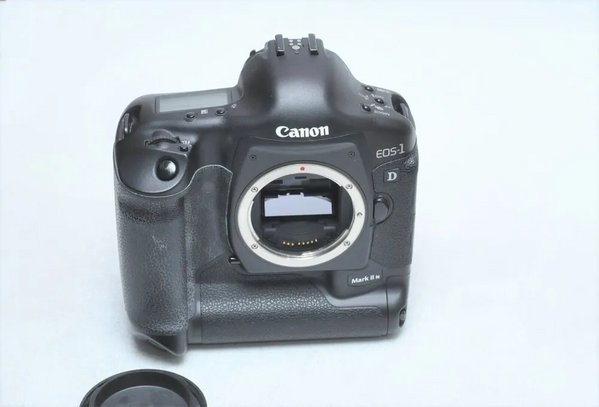
Canon 1D Mark II
| Brand | Canon 2004 |
| Model | EOS-1D Mark II |
| Released Year | 2004 |
| Type | DSLR Cameras |
| Series | EOS |
| Color | Black |
| Optical Zoom | N/A |
| Status | Discontinued |
Quick view
Overview
The Canon EOS-1D Mark II is a professional-grade DSLR camera released in 2004, featuring a 8.2-megapixel APS-H CMOS sensor. It offers a fast continuous shooting speed of up to 8.5 frames per second, making it ideal for sports and action photography. The camera includes a durable magnesium alloy body with weather sealing for rugged use. Its autofocus system employs 45 AF points for precise subject tracking. It supports CF memory cards for storage and uses the DIGIC II image processor for enhanced image quality and faster processing. Additionally, it comes with a large 2-inch LCD display for image playback and settings adjustments.
Specifications
| MPN |
|
| UPC |
|
| Model |
|
| Battery Type |
|
| Screen Size |
|
| Type |
|
| Maximum Resolution |
|
| Color | Black |
| Connectivity |
|
| Features |
|
| Series |
|
| Depth | 3.1in |
| Width | 6.1in |
| Item Weight |
|
| Height | 6.2in |
| Screen Details | LCD Display-Tft Active Matrix-2"-Color |
| Exposure Compensation | ±3 Ev Range, in 1/3 Ev Steps |
| Light Sensitivity | Iso 100-1600, 3200, 50, 100-1600 |
| Sensor Type |
|
| Exposure Range | Ev 0-20 (Iso 100) |
| Special Effects | Neutral, Black & White, Faithful, Sepia, Full Color |
| White Balance | Auto, Tungsten (Preset), Flash (Preset), Cloudy (Preset), Manual, Shade (Preset), Fluorescent (Preset), Daylight / Sunny (Preset) |
| Battery Form Factor | Manufacturer Specific |
| Focus Adjustment | Autofocus & Manual Focus |
| Operating System Supported | Microsoft Windows 98SE, Microsoft Windows 2000, Microsoft Windows XP, Microsoft Windows ME, Apple Mac Os X |
| Expansion Slot | 1X SD Memory Card, 1X CompactFlash Card-Type I/II |
| MAX Shutter SPEED | 1/8000 Sec |
| Sensor Size | 19.1x28.7mm |
| Display Size | 2in |
| Exposure Modes | Program, Aperture-Priority, Bulb, Shutter-Priority, Manual, E-TTL II Program Flash, Automatic |
| Still Image Format | Raw Image, Raw + JPEG, Raw, JPEG |
| Display Rotation | Built-In |
| Light Sensitivity MAX | 3200 |
| Optical Viewfinder Type | Fixed Eye-Level Pentaprism |
| Display Type | LCD |
| Sensor Resolution | 8.2MP |
| Exposure Metering | Evaluative, SPOT Af Area, SPOT, Partial (13.5%), Multi-SPOT, Center-Weighted |
| Min Shutter SPEED | 30 Sec |
| Additional Features | Direct Print, Self Timer, Auto White Balance, Built-In Microphone |
| Flash Type | None |
| Min Operating Temperature | 0°C |
| Continuous Shooting SPEED | 8.5fps |
| Viewfinder-Field Coverage | 100% |
| Exterior Color | Black |
| Microphone Type | Microphone-Built-In |
| MAX Operating Temperature | 45°C |
| Connector Types | 1X Composite Video Output, 1X Remote Control, 1X IEEE 1394 (FireWire/I.Link), 1X USB |
| Shooting Programs | Portrait Mode, Landscape |
| Dioptric Correction Range | -3 to +1 |
| Viewfinder Magnification | 0.72x |
| Camera Type | Digital SLR |
| Auto Focus Type | TTL Phase Detection |
| Viewfinder Type | Optical, Optical (Through-The-Lens) |
| Lens for Sd | Body only |
| Supported Flash Memory | CompactFlash Card Type I, CompactFlash Card Type II, CompactFlash II, SDHC Memory Card, Microdrive, SD Memory Card, CompactFlash I, SD Card |
| Bundle Listing | No |
| Country/Region of Manufacture | Japan |
| Maximum Aperture |
|
| Item Height |
|
| Item Width |
|
| California Prop 65 Warning | N/A |
| Digital Zoom | 1x |
| Item Length |
|
| Manufacturer Warranty | N/A |
| Optical Zoom | N/A |
| EAN | 0013803037050 |
| GTIN | 00013803037050 |
| Country | Japan |
| Lens Mount |
|
| Weight |
|
| Dimensions |
|
| Display | No built-in LCD (external monitor required) |
| Material |
|
| Battery | LP-E4N (not included) |
| Viewfinder |
|
| Power Source | BP-511A Battery Pack |
| Shipping | Same-day shipping available if ordered by 14:00 JST, including |
| Warranty | None |
Images
Key Advantages
The EOS-1D Mark II excels with its high-speed shooting capabilities, delivering up to 8.5 fps. Its rugged, weather-sealed body ensures reliable performance in demanding environments. The 8.2 MP APS-H sensor produces sharp images suitable for professional use. Autofocus with 45 points enhances accuracy and focus tracking of moving subjects. The DIGIC II image processor contributes to low noise and quick image processing. Its compatibility with Canon EF lenses provides users with a broad range of creative options.
Limitations
Despite its strengths, the EOS-1D Mark II has some limitations compared to newer models. Its APS-H sensor size is smaller than full-frame sensors found in later cameras. The 2-inch LCD screen is relatively small and lower resolution by modern standards. It lacks video recording capabilities, which limits versatility. The ISO range is narrower compared to contemporary DSLRs, affecting low-light performance. The camera uses now outdated CF memory cards, which may be less convenient. Battery life is good but not exceptional for extended shoots.
FAQ
When was the Canon EOS-1D Mark II released?
The Canon EOS-1D Mark II was released in 2004.
What sensor does the EOS-1D Mark II have?
It features an 8.2-megapixel APS-H CMOS sensor.
What is the continuous shooting speed of this camera?
The EOS-1D Mark II can shoot continuously at up to 8.5 frames per second.
Does the EOS-1D Mark II support video recording?
No, this model does not support video recording.
What type of memory cards does it use?
It uses CompactFlash (CF) memory cards.
Is the camera weather-sealed?
Yes, it has a rugged magnesium alloy body with weather sealing.
What autofocus system does it have?
It uses a 45-point autofocus system for precise subject tracking.
Disclaimer
The content on is provided for general informational purposes only. We do not guarantee the accuracy, completeness, or reliability of any information, specifications, or visuals presented on the site.
is not responsible for any content, images, or data uploaded or shared by users. Users are solely responsible for the content they submit.
We may include links to third-party websites for convenience. We do not endorse or take responsibility for the content or policies of any external sites.
Use of the site is at your own risk. Always verify critical information independently before making decisions based on content from this website.

